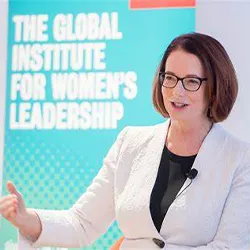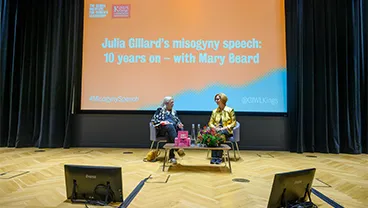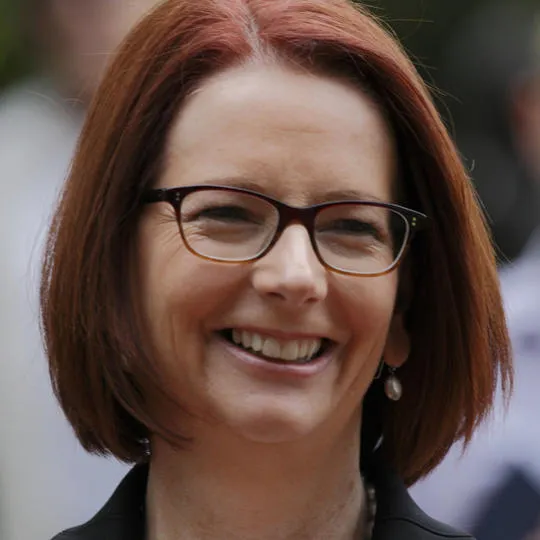October 2022 marks the 10th anniversary of Julia Gillard’s famous speech on misogyny to the Australian Parliament, an address that would resonate around the world. A decade later, Julia, the only woman to have served as Prime Minister of Australia, is chair of the Global Institute for Women’s Leadership at King’s (GIWL), an institution that works towards a world in which women of all backgrounds have equal access to leadership positions.
The speech
‘I will not be lectured about sexism and misogyny by this man. I will not’. So begins Julia Gillard’s iconic speech to the Australian Parliament, a response to opposition leader Tony Abbott’s accusation of sexism in the midst of a no confidence motion to remove then-Speaker, Peter Slipper, over misogynistic texts he sent to his aide.
A legacy in research
The speech continues to reach further into our collective consciousness to this day. 10 years later, Julia is still working to provide a platform for women to fairly enter leadership positions.
Globally, women make up just 32% of national parliamentarians, 21% of news media leaders, 31% of senior managers and 20% of corporate board members. Gender equality progress has been slow but, alarmingly, in some cases it is reversing. In 2015 the World Economic Forum estimated the economic gender gap would be closed by 2133, but in 2022, they revised this estimate to 2173.
The Institute aims to change this in three keys ways:
- Research: drawing together evidence from across sectors, disciplines and countries, and using that to undertake new solutions-based research.
- Practice: ensuring that the solutions determined by that research translate into policy and practice.
- Engagement: acting as a hub for a global community of academics, policymakers and activists across the world to come together and share their knowledge.
As a research-based organisation, GIWL utilises its evidence-centric approach in a diverse range of areas under the gender equality umbrella, including building inclusive work cultures, tackling under-representation and negative stereotyping in the media, measuring and mapping gender inequalities, and supporting women’s leadership in grassroots, local, national and global institutions.
Their ‘Essays on Equality’ anthologies, which are published annually, encapsulate the Institute’s research as a collection of ruminations on women’s leadership and gender equality, written by both researchers from GIWL itself and leading experts working in the field.
Improvement through empowerment
Looking back, Julia assesses the speech’s societal impact and the change that it initiated thus: ‘I think what we’re doing better is naming and shaming when we see sexism and misogyny. I think it’s impossible to imagine in Parliament today that a woman could be called the things that I was’. The Global Institute for Women’s Leadership is at the forefront of this changing landscape, and is working to ensure that the legacy of that famous speech continues to be one of improvement and empowerment.
In November 2022, GIWL hosted an in-conversation event featuring Professor Mary Beard and Julia Gillard to celebrate the speech’s legacy, and look ahead to what comes next in the fight for equality. You can watch back a livestream of the event here.
You can find out more about GIWL here. This article is part of the Research in Action series, which tells the story of the transformational impact that King’s is striving to achieve through research and the researchers who make it happen. You can read more stories like this here.
GIWL’s work is only made possible through the generosity of King’s alumni and supporter community. Philanthropic support for their mission is vital, whether it’s through supporting one of their projects aiming to breakdown systemic barriers to leadership, funding an early career researcher to look at how gender intersects with race, or joining their closest supporters in their Founding Circle – a visionary group of 20 philanthropists coming together to provide £1.5 million in seed funding – your involvement and partnership can effect real change. Click here to find out more about how you have a transformational impact on society by donating to King’s.




